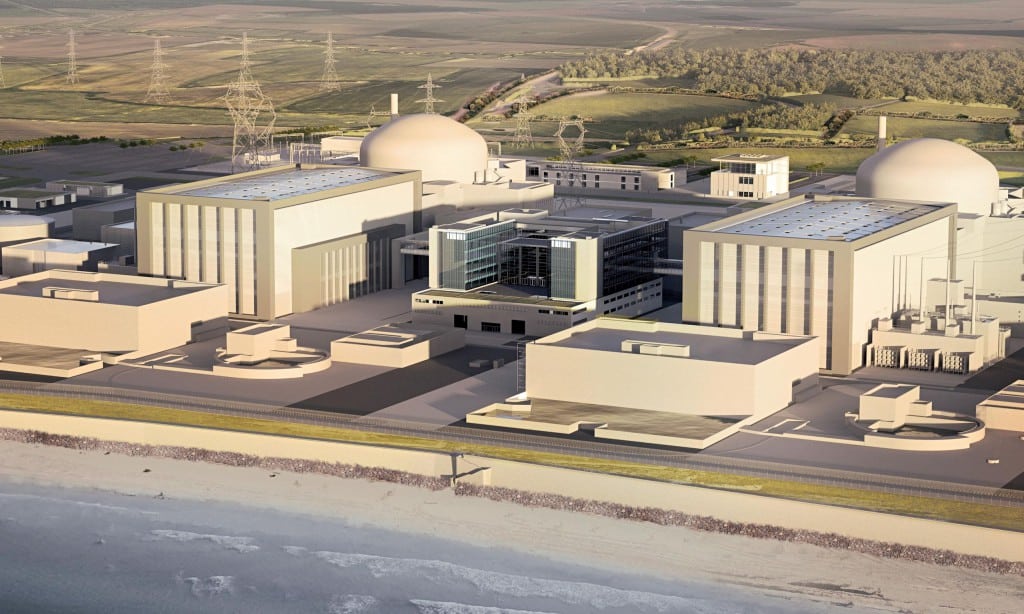Hinkley Point on the Brink as EDF Seeks French Support
The proposed expansion of the Hinkley Point nuclear plant in the U.K., a joint project between French-based EDF and Chinese firm CGN, was thrown into fresh doubts this month as EDF's CEO said the project cannot proceed without additional financial support from the French government.
The hugely expensive project-at 18 billion ($25.5 billion) it would be the most expensive power plant in the world by far and cost more than EDF's entire market value if it goes forward-has gravely challenged its backers' ability to secure necessary financing. When CGN agreed to take a 33.5% stake in October 2015, its participation was expected to ease closing, but EDF is still reportedly 11 billion short of what it needs.
The Hinkley Point C project would add two new reactors adjacent to the existing Hinkley Point A and B nuclear plants, the first of which operated from 1965 to 2000, and the second from 1976 with a planned retirement date in the 2020s. Hinkley Point C would comprise two AREVA EPR designs totaling 3,200 MW (Figure 1).
- Fraught with controversy. The proposed two-unit, 3,200-MW Hinkley Point C nuclear power plant in the UK would employ EDF's troubled EPR design, which has experienced engineering problems and large cost overruns in the four projects currently under construction. Hinkley Point has drawn fire for its huge $25 billion price tag and generous power price guarantees from the British government. Courtesy: EDF
EDF CEO Jean-Bernard Levy said in a letter to employees this month that the company was negotiating for additional support from the French government. Levy said that while he continued to believe that Hinkley Point is a "good project" for the company-which is 85% owned by France-the financing has been challenging enough that it cannot proceed without additional state backing.
"It is clear that I will not engage EDF in this project before these conditions are met," Levy said.
EDF in fact needs to come up with more than 16 billion to match the 2 billion it has already spent. The European Commission (EC), when it approved the deal in 2014, required EDF and its partners to prepare for contingent costs up to 24.5 billion to protect the UK government.
The EC was no doubt moved to this condition because of experiences with EPR-based projects thus far.
One of the major challenges of Hinkley Point is that the EPR design has been beset with continuing delays and cost overruns. Four EPRs are currently under construction, two in China, one in France, and one in Finland. The Olkiluoto 3 plant in Finland is currently 10 years behind schedule, with a price tag that has ballooned from a3 billion to a8 billion, resulting in claims against AREVA that threatened its viability.
The Flamanville 3 project in France has also struggled with huge cost overruns that have pushed the total cost over a10 billion, as well as with repeated engineering and construction problems. Neither reactor is expected to begin operations before 2018. The two Chinese plants are also behind schedule, and AREVA in March 2015 asked the U.S. Nuclear Regulatory Commission to suspend its safety review of the U.S. EPR design until further notice.
AREVA's troubles were enough to spur EDF in July 2015 to propose buying up a majority of the firm's nuclear business in a possible $3 billion deal that was meant to shore up the financial health of France's nuclear sector.
Political ConsiderationsThe fate of Hinkley Point has been as much a political struggle as an economic and engineering one. The UK government, beginning with Prime Minister David Cameron, has backed Hinkley Point to such an extent that it has guaranteed the project far-above-market rates for its electricity: 92.50/MWh in 2012 prices. With inflation, this figure is now nearly three times the wholesale electricity price in the UK, currently around 37/MWh.
But others in the British government have raised concerns. Angus MacNeil, chairman of the House of Commons energy committee, recently cast doubt on Hinkley Point, saying the entire project needed to be re-examined and the government should rethink its support.
Hinkley Point has been enormously controversial with the British public, with environmental groups questioning the huge cost of the project even as the government is scaling back its support for renewable generation.
Doubts have also arisen across the channel in France. Two senior EDF executives-its chief financial officer and the Hinkley Point project director-have quit in recent months, reportedly because of concerns over the project's viability. French labor union CFE-CGC, which is represented on EDF's board, has come out against the deal, saying it could deal a "fatal blow" to the company should it go sour. But analysts also suggest that the French government is unlikely to leave EDF hanging despite the financial risks.
Hinkley Point Failure Could Sour Sino-British RelationsThe political and economic costs of cancelling Hinkley Point could be dire. Analysts have suggested that a collapse of the project, into which EDF has already sunk 2 billion, could threaten the firm's finances in addition to casting doubt on the future of the EPR design. Meanwhile, it would throw Britain's energy and climate policymaking into serious disarray.
The government has repeatedly justified its support of the deal as a key part of its transition away from fossil generation, particularly coal-Hinkley Point, if completed, would supply 7% of the nation's electricity. Cancellation would also complicate Britain's relations with China, as Cameron recently reaffirmed his faith in Hinkley Point during Chinese President Xi Jinping's visit to the UK in October 2015 when CGN came onboard.
Levy said in his letter that EDF hopes to make final decisions on how to finance Hinkley Point in April. Should financing close, construction is slated to begin in 2019.
-Thomas W. Overton, JD is a POWER associate editor (@thomas_overton, @POWERmagazine).
The post Hinkley Point on the Brink as EDF Seeks French Support appeared first on POWER Magazine.
